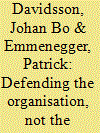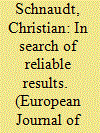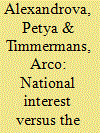|
|
|
Sort Order |
|
|
|
Items / Page
|
|
|
|
|
|
|
| Srl | Item |
| 1 |
ID:
120144


|
|
|
|
|
| Publication |
2013.
|
| Summary/Abstract |
European labour markets are often described as rigid with comparatively high levels of job protection that do not allow for the flexible adjustment of employment to economic fluctuations. This interpretation overlooks important sources of flexibility, however. Research has shown that recent labour market policy reforms have allowed for the creation of two-tier labour markets consisting of insiders in standard employment relationships and outsiders in non-standard employment. This outcome has typically been explained by pointing to the representational interests of unions or social-democratic parties. It has been argued that rather than protecting all labour market participants, unions and social-democratic parties focus on the interests of their members and their core constituency, respectively, most of whom are in standard employment relationships. In contrast, it is argued here that unions' institutional power resources are the crucial variable explaining this outcome. In difficult economic times, when unions are asked to make concessions, they will assent to labour market reforms, but only to those that do not fundamentally threaten to undermine their organisational interests. In the context of job security legislation, this means that unions defend the protection of permanent contracts while they compromise on the regulation of temporary employment. This 'second best solution' allows them to protect their organisational interests, both by retaining their institutional role in the administration of dismissals and by living up to their institutional role as one of the organisations responsible for the direction of labour market policy reform. Using fsQCA this article shows that unions' institutional power resources are more apt to explain the observed two-tier reform pattern than the unions' or the social-democratic parties' representational interests.
|
|
|
|
|
|
|
|
|
|
|
|
|
|
|
|
| 2 |
ID:
120146


|
|
|
|
|
| Publication |
2013.
|
| Summary/Abstract |
In this article an integrated framework of agenda-setting is proposed that incorporates the two main accounts of agenda-setting: the information-processing approach by Comparative Agenda Project scholars and the preference-centred account advanced by Comparative Manifestoes Project scholars. The study claims that attention allocation is determined at the same time by preferences, information and institutions, and that attention allocation is affected by the interactions between these three factors. An empirical test is conducted that draws upon a dataset of parliamentary questions/interpellations in Belgium in the period 1993-2000. It is found that attention in parliament is indeed driven by preceding party manifestos (preferences), by available information (media coverage) and by institutional position (government or opposition party). The evidence establishes that agenda-setting is also affected by the interactions between preferences, information and institutions. Actors, given their preferences, treat information in a biased fashion, and institutions moderate information's role.
|
|
|
|
|
|
|
|
|
|
|
|
|
|
|
|
| 3 |
ID:
120147


|
|
|
|
|
| Publication |
2013.
|
| Summary/Abstract |
In a recently published article in this journal, Ross Campbell argues that adherence to socialist values establishes a hitherto neglected factor when it comes to the explanation of differences in East and West German citizens' political trust. As the results of his study indicate, adherence to socialist values impacts negatively on citizens' political trust, this effect is more pronounced and more stable over time for East German as compared to West German citizens and is sufficiently strong to eliminate aggregate-level differences in political trust between East and West Germany. However, this research note suggests that Campbell's article contains several substantial inconsistencies and obscurities that question the reliability and validity of the empirical findings presented. It provides a re-analysis of Campbell's main arguments and shows to what extent his initial conclusions can be upheld after the shortcomings have been remedied. The results of this re-analysis suggest that socialist values indeed exhibit a negative impact on German citizens' political trust, which is relatively stronger for East as compared to West German citizens. However, contrary to Campbell's initial results, the negative effect of socialist values on political trust is robust over time for both East and West German citizens. What is more, there is no empirical evidence confirming that differences in adherence to socialist values between East and West German citizens are sufficiently strong to account for aggregate-level differences in political trust. In light of these findings, two of Campbell's three main conclusions are dubious and call for further examination.
|
|
|
|
|
|
|
|
|
|
|
|
|
|
|
|
| 4 |
ID:
120143


|
|
|
|
|
| Publication |
2013.
|
| Summary/Abstract |
The European Council is an institution which brings together the Heads of State, or Governments of the European Union (EU) Member States. For the Presidency, preparing the agenda of European Council meetings involves a tension between loyalties. Existing research is divided over the question whether the Presidency pushes its domestic policy agenda on the EU level. Using empirical data on the Conclusions of European Council meetings, and national executive speeches presented annually in five Member States, this article investigates the relationship between the policy agendas of the EU and its constituent countries. It tests whether national issue attention of the Presidency holder dominates the European Council agenda. The findings suggest that having the Presidency does not provide a de facto institutional advantage for agenda setting power for any of the countries in the sample. The analysis points out that normative and political constrains limit the leeway of presiding Member States to push for domestic agenda preferences in the European Council.
|
|
|
|
|
|
|
|
|
|
|
|
|
|
|
|
| 5 |
ID:
120142


|
|
|
|
|
| Publication |
2013.
|
| Summary/Abstract |
In recent years, transparency (or the lack thereof) has become a central concern of the European Union and its attempts to increase the democratic legitimacy of the legislative decision-making process. The claim regularly made is that increasing transparency increases the potential for holding decision makers to account. This study investigates the manner in which transparency in the decision-making process affects the policy positions taken by negotiators at the outset of negotiations. The findings presented suggest that increasing transparency tends to lead to polarisation of negotiations, with negotiators taking more extreme positions when they know that their positions can be observed by outside parties. The implication of this result is that advocates of transparency should be aware that there is an inherent trade-off between increasing transparency, on the one hand, and increasing the incentives to grandstand during negotiations, on the other.
|
|
|
|
|
|
|
|
|
|
|
|
|
|
|
|
| 6 |
ID:
120145


|
|
|
|
|
| Publication |
2013.
|
| Summary/Abstract |
Recent studies have drawn attention to the political contingencies of the media's political agenda-setting influence, finding, for instance, that issues from the media agenda are more likely to attract attention if a party enjoys ownership of the issue. Supplementing the debate on why political parties respond to news, it is argued in this article that ownership is only part of the picture and that policy responsibility, together with news tone, constitutes a stronger explanation of news politicisation. Opposition parties respond to bad news because they reflect negative developments in social problems for which the government could be held responsible. The government responds to good news that reflects positive developments in social problems because this could politicise policy success, but is also forced to react when news explicitly address government responsibility and thereby threatens its image as responsive and competent. Furthermore, it is shown that news tone and policy responsibility condition the incentive to politicise owned issues from the media agenda. Thus, opposition parties will not politicise owned issues when news is good because this could draw attention to government success, while government is unable and unwilling to prioritise owned issues when news is bad and instead is likely to make use of its ownership strengths when news is good and the pressure to respond is low. The arguments are tested on a large-N sample of radio news stories from Denmark (2003-2004). Opposition response is measured through parliamentary questions spurred by the news stories, while government response is indicated by references to these stories in the prime minister's weekly press meeting. Results confirm the expectations, suggesting that parties care more about the tone of news stories and the type of attention they might produce, rather than what type of issues they could serve to politicise.
|
|
|
|
|
|
|
|
|
|
|
|
|
|
|
|
|
|
|
|
|